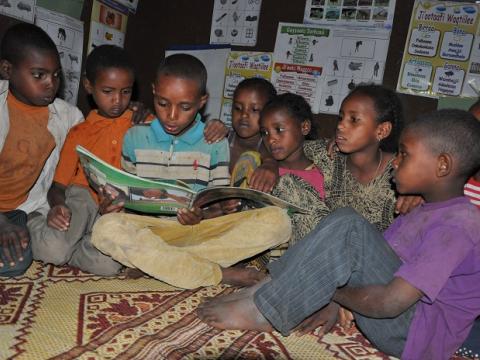Literacy must be on the global development agenda

One of my favourite dates on the calendar is September 8: International Literacy Day. As the cornerstone of development, literacy unlocks human potential. It leads to better health, better employment opportunities and safer and more stable societies. In short, literacy matters – to children, adults and nations.
This year is especially important: the Millennium Development Goals (MDGs) will expire in September, and the Sustainable Development Goals (SDGs) will set the agenda for the next 15 years of global progress on education and development. In 2000, when the MDGs were adopted, approximately 100 million children of primary school age were out-of-school. Since then, this number has fallen by almost half. The literacy rate among young people between 15 and 24 years of age has increased globally from 83 per cent in 1990 to 91 per cent this year.
These numbers should be lauded, but carefully. The expansion in children’s school enrolment is a great gain, but has strained the capacity of education systems to provide quality learning. Globally, 250 million children, including many of the most vulnerable, are not learning the basic – reading, writing and math – even though half have attended school for at least four years.
Giving children a “Literacy Boost”
Some days these numbers seem daunting: How do we help 250 million children learn, many of whom live in countries struggling with conflict and dire poverty? One way that World Vision is helping to provide quality education is through Literacy Boost, an evidence-based literacy programme that supports the development of reading skills in young children[1]. It’s proven to strengthen learning outcomes through: reading assessments, teacher training and community activities like reading clubs and parental awareness training. This approach is working.
In Ethiopia, where our largest Literacy Boost effort is underway, nearly 750,000 children have joined after-school reading clubs.
In Ethiopia, where our largest Literacy Boost effort is underway, nearly 750,000 children have joined after-school reading clubs. Led by a team of over 9,000 community volunteers, World Vision Ethiopia, in partnership with the government and local communities, has set up nearly 2,400 reading clubs across the country. These clubs reinforce the skills that children learn in school through stories, games and other creative activities.
Ten-year-old, Addisu, a grade three student from the Tullo District of Oromia Region, Ethiopia, is one of 120 children attending his local Literacy Boost reading club. When he first joined in January 2014, he could only read a few words and wasn’t interested in school. Now he never misses a session and has encouraged his siblings to join as well.
Our results in Addisu’s community are astounding. Before Literacy Boost began in the Oromia Region, only 3 per cent of students could read with comprehension. After one year, students in the programme gained significantly more in each reading sub-test than students who had not. Our latest assessment showed that 28 per cent of Literacy Boost students had become new readers compared to 12 per cent in comparison schools[2].
Addisu leads fellow reading camp attendees in an activity. (Photo credit: Feleseta Kassaye / World Vision)
World Vision is currently in various stages of implementing Literacy Boost in 11 countries in sub-Saharan Africa and Asia. We’re seeing good results from countries like Burundi, Malawi and India.
Creating a world in which all children can read and write
Members of the United Nations will meet later in September at the United Nations General Assembly (UNGA) to discuss and adopt the SDGs. We need global leaders to refocus on the role of education in poverty reduction. The global community must make a concerted effort to appropriately measure and fund education programming for the most vulnerable children.
The global community must make a concerted effort to appropriately measure and fund education programming for the most vulnerable children.
Children like Addisu need to be in the forefront of all discussions leading up to the adoption of the SDGs, as do the millions of children who missed out on the success of the MDGs. Quality education and the acquisition of literacy skills can help lead to a new era of economic development, and continued momentum towards a world where children have the literacy skills they need to succeed in work and in life.
Related links:
- Will post-2015 education goals be enough for the world's most vulnerable children?
- Education is more than a numbers game for children
- Tackling poverty demands improving education
Linda Hiebert is the Senior Director, Education and Life Skills at World Vision International. She has over 25 years of experience in international development, including work as programme officer, director and vice-president in a number of countries and regions. Linda has a Bachelor's degree in Nursing, and a Master's degree in Development from Harvard's Kennedy School of Government.
Follow Linda on Twitter @LindaHiebertWV.
___________________________